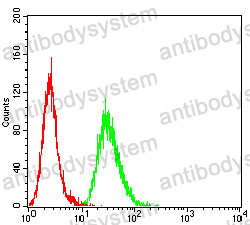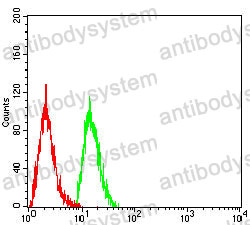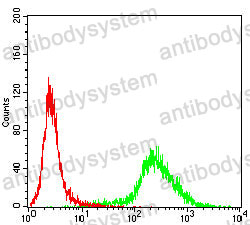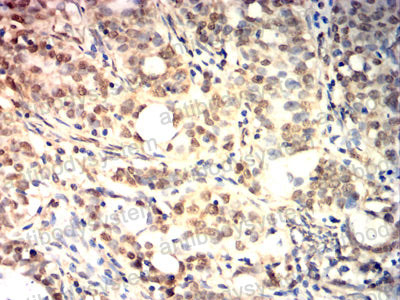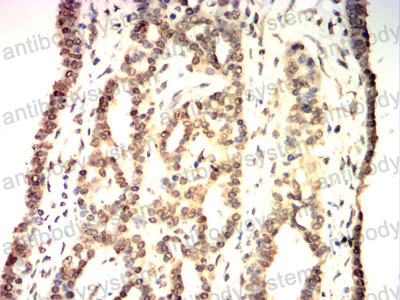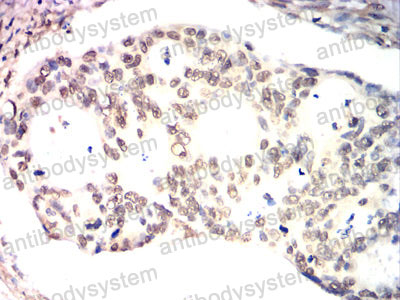Catalog No.
RHD31502
Species reactivity
Human
Host species
Mouse
Isotype
IgG1
Clonality
Monoclonal
Tested applications
ELISA: 1:10000, FCM: 1:200-1:400, IHC: 1:200-1:1000, WB: 1:500-1:2000
Target
DNA repair protein XRCC1, XRCC1, X-ray repair cross-complementing protein 1
Concentration
1 mg/ml
Endotoxin level
Please contact with the lab for this information.
Purity
>95% as determined by SDS-PAGE.
Purification
Protein A/G purified from cell culture supernatant.
Accession
P18887
Applications
ELISA, FCM, IHC, WB
Form
Liquid
Storage buffer
0.01M PBS, pH 7.4, 0.05% Sodium Azide.
Stability and Storage
Use a manual defrost freezer and avoid repeated freeze-thaw cycles. Store at 4°C short term (1-2 weeks). Store at -20°C 12 months. Store at -80°C long term.
Clone ID
R3F07
A Knockout of Poly(ADP-Ribose) Polymerase 1 in a Human Cell Line: An Influence on Base Excision Repair Reactions in Cellular Extracts., PMID:38391916
Dynamics of DNA damage response markers, RAD51 and XRCC1, throughout the menstrual cycle and pregnancy in healthy women. Increment during pregnancy and relation to a low titer of antinuclear antibodies., PMID:35816185
Quantitative Multiplexed Proteomics Could Assist Therapeutic Decision Making in Non-Small Cell Lung Cancer Patients with Ambiguous ALK Test Results., PMID:34066104
Association Between DNA Damage Response, Fibrosis and Type I Interferon Signature in Systemic Sclerosis., PMID:33123169
Pharmacogenetic analyses of 2183 patients with advanced colorectal cancer; potential role for common dihydropyrimidine dehydrogenase variants in toxicity to chemotherapy., PMID:30114658
KDM5B demethylates H3K4 to recruit XRCC1 and promote chemoresistance., PMID:29989047
Evaluation of candidate genes associated with hepatitis A and E virus infection in Chinese Han population., PMID:29558945
Coordination of DNA single strand break repair., PMID:27890643
Phase II clinical study of valproic acid plus cisplatin and cetuximab in recurrent and/or metastatic squamous cell carcinoma of Head and Neck-V-CHANCE trial., PMID:27884140
Generation of an alpaca-derived nanobody recognizing γ-H2AX., PMID:26500838
Influence of allelic Variations of hypoxia-related and DNA repair genes on patient outcome and toxicity in head and neck cancer treated with radiotherapy plus cetuximab., PMID:26245169
Treatment effect of buparlisib, cetuximab and irradiation in wild-type or PI3KCA-mutated head and neck cancer cell lines., PMID:25603975
Patients with systemic sclerosis present increased DNA damage differentially associated with DNA repair gene polymorphisms., PMID:24488411
Polymorphisms in STK17A gene are associated with systemic lupus erythematosus and its clinical manifestations., PMID:23860322
The DNA repair protein XRCC1 functions in the plant DNA demethylation pathway by stimulating cytosine methylation (5-meC) excision, gap tailoring, and DNA ligation., PMID:23316050
Partial complementation of a DNA ligase I deficiency by DNA ligase III and its impact on cell survival and telomere stability in mammalian cells., PMID:22460582
Variants in ABCB1, TGFB1, and XRCC1 genes and susceptibility to viral hepatitis A infection in Mexican Americans., PMID:22135187
Role of genetic polymorphisms and mutations in colorectal cancer therapy (Review)., PMID:21468552
Subcellular distribution of a fluorescence-labeled combi-molecule designed to block epidermal growth factor receptor tyrosine kinase and damage DNA with a green fluorescent species., PMID:20354119
DNA repair gene XRCC1 polymorphisms and haplotypes in diffuse large B-cell lymphoma in a Korean population., PMID:19963133
Parp1-XRCC1 and the repair of DNA double strand breaks in mouse round spermatids., PMID:19887075
Pharmacogenetics in chemotherapy of colorectal cancer., PMID:19414151
Efficiency of the DNA repair and polymorphisms of the XRCC1, XRCC3 and XRCC4 DNA repair genes in systemic lupus erythematosus., PMID:18852222
DNA repair polymorphisms and the risk of stomach adenocarcinoma and severe chronic gastritis in the EPIC-EURGAST study., PMID:18641418
The methyl methanesulfonate induced S-phase delay in XRCC1-deficient cells requires ATM and ATR., PMID:18375193
Tumors established with cell lines selected for oxaliplatin resistance respond to oxaliplatin if combined with cetuximab., PMID:18094427
DNA single-strand break repair is impaired in aprataxin-related ataxia., PMID:17315206
Base excision repair proteins are required for integrin-mediated suppression of bleomycin-induced DNA breakage in murine lung endothelial cells., PMID:17202402
APE1 and XRCC1 protein expression levels predict cancer-specific survival following radical radiotherapy in bladder cancer., PMID:16144922
Specificity of protein interactions mediated by BRCT domains of the XRCC1 DNA repair protein., PMID:15987676
Repair of U/G and U/A in DNA by UNG2-associated repair complexes takes place predominantly by short-patch repair both in proliferating and growth-arrested cells., PMID:15479784
In situ analysis of repair processes for oxidative DNA damage in mammalian cells., PMID:15365186
[Report of the National Oncology Research and Developement Consortium, 2003]., PMID:15105900
Spatial and temporal cellular responses to single-strand breaks in human cells., PMID:12748298
XRCC1 and CYP2E1 polymorphisms as susceptibility factors of plasma mutant p53 protein and anti-p53 antibody expression in vinyl chloride monomer-exposed polyvinyl chloride workers., PMID:12010862
Cloning and characterization of the promoter of baboon XRCC1, a gene involved in DNA strand-break repair., PMID:9776979
XRCC1 protein interacts with one of two distinct forms of DNA ligase III., PMID:9136882
DNA ligase IV from HeLa cell nuclei., PMID:8798671
Analysis and comparison of the mouse and human immunoglobulin heavy chain JH-Cmu-Cdelta locus., PMID:8673297
Characterization of the XRCC1-DNA ligase III complex in vitro and its absence from mutant hamster cells., PMID:8532526
Alterations in expression and structure of the DNA repair gene XRCC1., PMID:1353960

